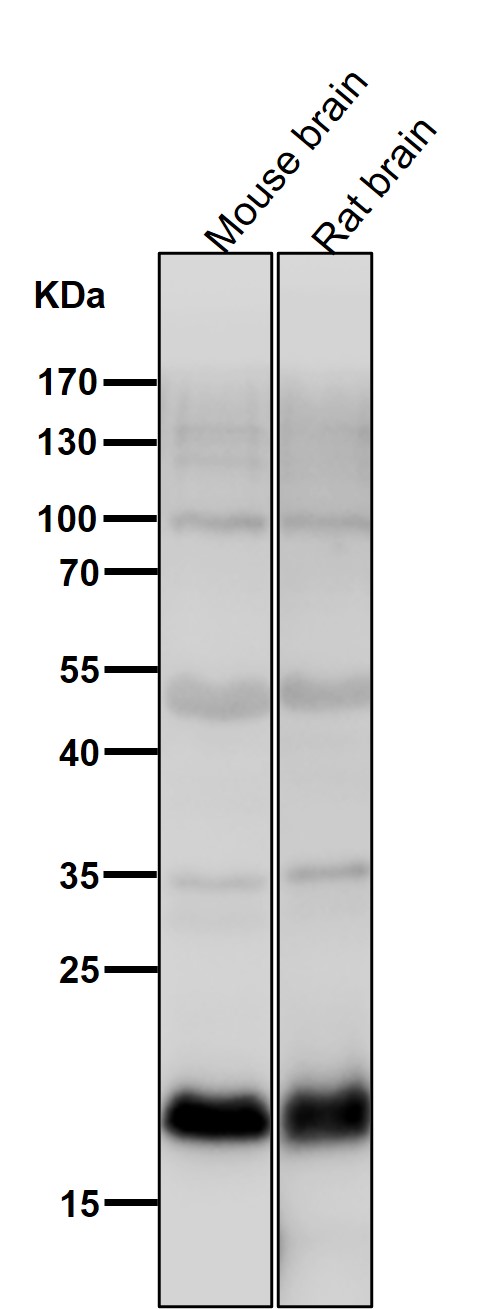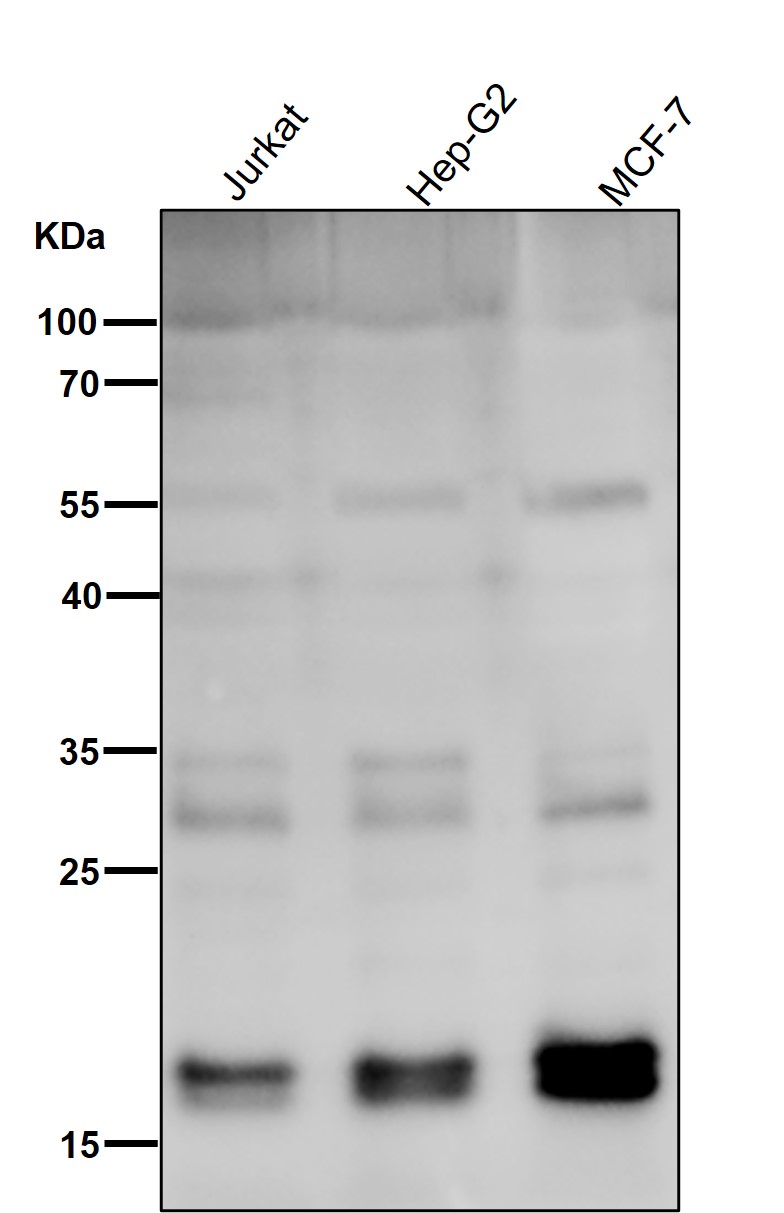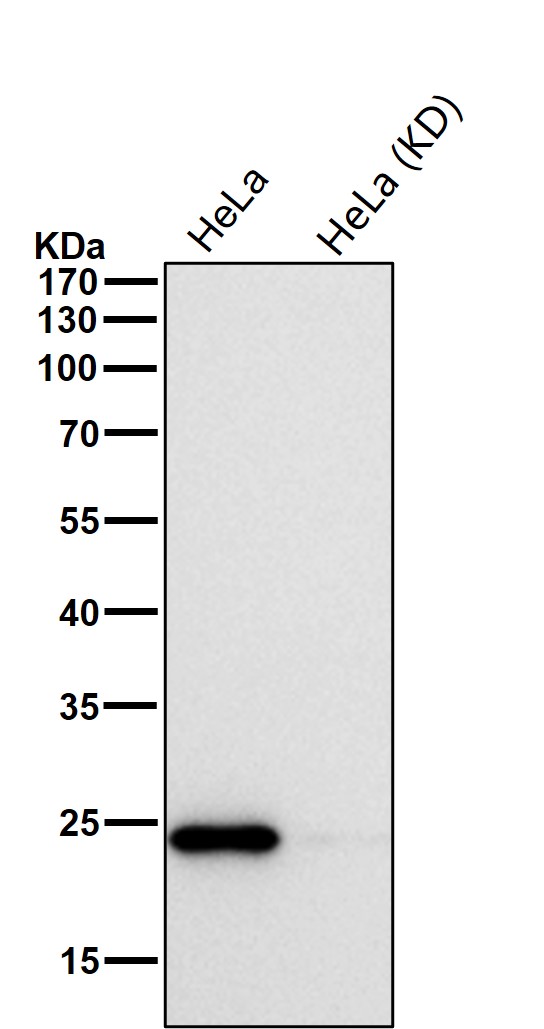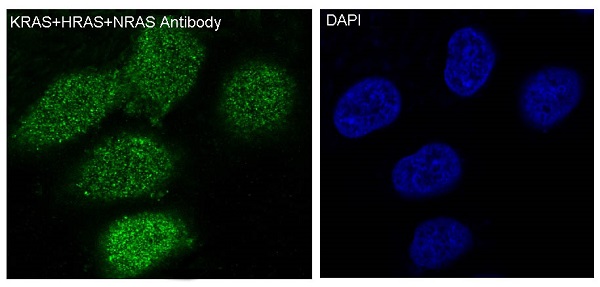



| WB | 咨询技术 | Human,Mouse,Rat |
| IF | 1/20-1/50 | Human,Mouse,Rat |
| IHC | 咨询技术 | Human,Mouse,Rat |
| ICC | 1/50-1/200 | Human,Mouse,Rat |
| FCM | 1/20-1/100 | Human,Mouse,Rat |
| Elisa | 咨询技术 | Human,Mouse,Rat |
| Aliases | GTPase NRas; Transforming protein N-Ras; NRAS; HRAS1; GTPase HRas; H-Ras-1; Ha-Ras; Transforming protein p21; c-H-ras; p21ras; HRAS; HRAS1; GTPase KRas; K-Ras 2; Ki-Ras; c-K-ras; c-Ki-ras; KRAS; KRAS2; RASK2;;Ras |
| WB Predicted band size | Calculated MW: 21,22 kDa ; Observed MW: 21 kDa |
| Host/Isotype | Rabbit IgG |
| Antibody Type | Primary antibody |
| Storage | Store at 4°C short term. Aliquot and store at -20°C long term. Avoid freeze/thaw cycles. |
| Species Reactivity | Human,Mouse,Rat |
| Immunogen | A synthesized peptide derived from human Ras |
| Formulation | Purified antibody in PBS with 0.05% sodium azide,0.05% BSA and 50% glycerol. |
+ +
以下是3篇与KRAS/HRAS/NRAS抗体相关的代表性文献示例(注:部分信息为示例性概括,具体文献需根据实际数据库检索):
---
1. **文献名称**: *"Development of pan-RAS monoclonal antibodies for functional analysis of RAS isoforms in cancer"*
**作者**: Smith A, et al.
**摘要**: 本研究开发了一组针对KRAS、HRAS和NRAS共同保守表位的单克隆抗体,能够交叉识别三种RAS蛋白。抗体应用于免疫印迹和免疫组化,验证了其在结直肠癌和肺癌样本中检测RAS蛋白表达及突变体的有效性,为研究RAS信号通路提供工具。
2. **文献名称**: *"High-affinity antibodies targeting RAS oncoproteins: challenges and therapeutic potential"*
**作者**: Johnson B, et al.
**摘要**: 综述讨论了针对KRAS、HRAS和NRAS突变体的抗体开发策略,包括表位选择、亲和力优化及工程化改造(如纳米抗体)。重点分析了抗体在阻断RAS-效应蛋白相互作用中的应用,以及其在胰腺癌临床前模型中的疗效数据。
3. **文献名称**: *"Comparative evaluation of RAS isoform-specific antibodies in tumor diagnosis"*
**作者**: Lee C, et al.
**摘要**: 研究比较了多种商业化KRAS、HRAS、NRAS抗体的特异性与灵敏度,发现部分抗体存在交叉反应。通过质谱验证,提出了优化抗体选择的标准,以提高突变体检测在甲状腺癌和黑色素瘤中的准确性。
---
如需具体文献,建议通过PubMed或Google Scholar检索关键词:
`KRAS antibody`、`HRAS antibody`、`NRAS antibody`、`pan-RAS detection`,并筛选近5年高被引论文。
The KRAS, HRAS, and NRAS proteins belong to the RAS family of small GTPases, which play pivotal roles in regulating cell signaling pathways involved in proliferation, differentiation, and survival. These proteins cycle between inactive GDP-bound and active GTP-bound states, acting as molecular switches. Mutations in RAS genes (particularly KRAS, which is most frequently altered) are common in human cancers, leading to constitutive activation of downstream pathways like MAPK/ERK, driving uncontrolled cell growth and tumor progression.
Antibodies targeting KRAS, HRAS, and NRAS are critical tools for studying their expression, localization, and post-translational modifications in both normal and diseased states. Due to the high sequence homology (∼85%) among these isoforms, developing isoform-specific antibodies has been challenging. However, advances in epitope mapping and recombinant antibody technologies have improved specificity. These antibodies are widely used in techniques such as Western blotting, immunohistochemistry (IHC), and immunofluorescence to assess RAS overexpression or mutation status in tumor samples.
In clinical diagnostics, RAS mutation-specific antibodies (e.g., anti-KRAS G12D/G12V) help stratify patients for targeted therapies, such as EGFR inhibitors in colorectal cancer, where KRAS mutations confer treatment resistance. Similarly, NRAS mutations in melanoma and HRAS alterations in bladder/thyroid cancers guide therapeutic decisions. Despite challenges in cross-reactivity, RAS antibodies remain indispensable for both basic research and precision oncology applications.
×